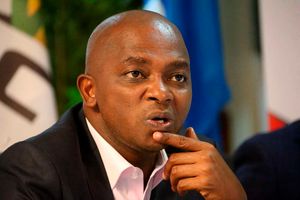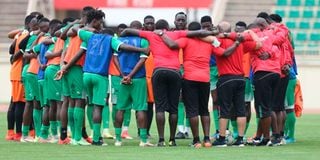
Harambee Stars players huddle during a training session at Nyayo National Stadium on October 9, 2021 on the eve of their 2022 Fifa World Cup qualifying match against Mali.
On February 10, 2016, a 37-year-old Nick Mwendwa was overwhelmingly chosen as the new president of Football Kenya Federation.
The youthful, loquacious Kariobangi Sharks chairman had campaigned on the slogan of change, mesmerizing the delegates with his vision of football in Kenya and what needed to be done for the country to regain its lost glory.
“We have to understand that new things have come,” he said in his acceptance speech at the polls venue, Kenya’s football Mecca, the Moi International Sports Centre.
“New ways of doing things have come. I want Kenyans to understand this,” Mwendwa said, like a sage, sounding wise for his age.
He acknowledged that it was a big task to manage the national team and he would keep his campaign promise to qualify Kenya for the Africa Cup of Nations and the 2022 Qatar World Cup.
At that time, Harambee Stars were ranked 99 in the world, had gone 12 years without qualifying for the Africa Cup of Nations and had last won the regional Cecafa Senior Challenge Cup in 2013 when it was hosted in Kenya.
Several days later, Mwendwa, amidst talk of setting up structures and long-term plans, announced the appointment of former Kariobangi Sharks coach Stanley Okumbi, a complete greenhorn in international football, as the new Harambee Stars coach on a three-year contract, assisted by Musa Otieno and Frank Ouna.
The untried Okumbi, then 35, replaced serial Cecafa Senior Challenge Cup winner Bobby Williamson who had recorded a string of disappointing results.
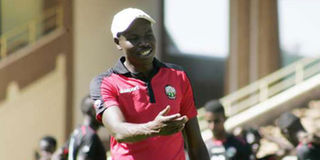
Harambee Stars coach Stanley Okumbi reacts during a training session on March 15, 2016 at Safaricom Stadium, Kasarani.
Mwendwa was quick to clarify that they had not sacked the Scotsman but had told him to step aside, a decision that would later come to bite the federation as they were forced to pay Sh55m for unfair dismissal.
The FKF boss also said that he aimed to invest in youthful coaches and build for the future. The soft-spoken Okumbi, amidst criticism, included two uncapped Kariobangi Sharks novices, Patillah Omotto and Ovella Ochieng in the final 20-man squad to face Guinea Bissau in back-to-back 2017 Afcon qualifiers.
The wisdom of Mwendwa’s choice quickly unravelled as Okumbi lost the two easy fixtures in quick succession, 1-0 in Bissau and 1-0 in Nairobi, effectively ending Harambee Stars’ hopes of qualifying for the 2017 African finals. Accusations were made of Mwendwa's undue influence in national team selection.
The FKF boss responded on June 30, 2016 by appointing German Andrew Spiers as the technical director of Kenyan football in a two-year contract that yielded little in terms of the kind of football Kenya should play.
Mwendwa finally bowed to public pressure and, discarding his highly touted youth focus, appointed much-travelled 60-year-old Belgian Paul Put in November 2017 with Okumbi demoted to assistant coach.
Put guided Harambee Stars to the Senior Challenge Cup of that year that was hosted by Kenya, needing post-match penalties to defeat Zanzibar 3-2 in the final after a 2-2 draw in regulation time.
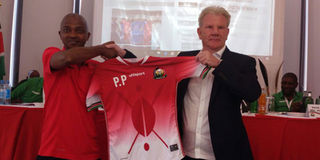
Belgian national Paul Put when he was officially unveiled by FKF president Nick Mwendwa as Harambee Stars coach.
He resigned after barely three months under unclear circumstances and the tried and failed Okumbi was again appointed head coach albeit in an acting capacity for just over two months before little-known Frenchman Sebastian Migne was named new coach in May 2018 with Mwendwa saying 'he was the right man to take Harambee Stars places", viz. Afcon and World Cup. Okumbi was "redeployed" to coach Kenya Under-20.
Migne, who was on his second career national team coach job, beat Ghana 1-0 in Nairobi in a 2019 Afcon qualifier on the way to a rare finals qualification that was helped in part by the expulsion of Sierra Leone from Kenya’s qualifying group.
Migne, however, failed to get Kenya past the group stages after defeats by Algeria (2-0) and Senegal (3-0) and a win against Tanzania (3-2). FKF terminated his services on August 12, 2019 with talks of a fallout over payments concerning the coach.
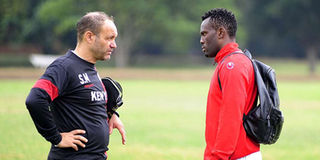
Coach Sebastian Migne (left) shares tips with Harambee Stars defender David Owino during their training session at the Kenya School of Monetary Studies on September 5, 2018.
The federation had received an unprecedented Sh244 million Kenyan government grant to help prepare Harambee Stars for the Nations Cup in Egypt.
It is, in fact, partly because of the federation’s failure to account for these monies that led to a government-sanctioned probe that resulted in the Sports CS Amina Mohamed disbanding the football body on November 11, 2021.
With the 2022 World Cup qualifiers kick-off 13 months away, Mwendwa announced the surprise appointment of a semi-retired Jacob “Ghost” Mulee as Harambee Stars coach on October 21, 2020 on a three-year deal.
Mulee, who was then a rather successful talk show host with Radio Jambo, was returning for his fifth stint with the senior national team, his last having come over a decade ago.
Mulee, though, registered a decent record of four wins, four draws and one loss in his nine outings. But crucially, he failed to win a World Cup (2022) qualifier, drawing 0-0 with Uganda in Nairobi and 1-1 with Rwanda in Kigali.

FKF president Nick Mwendwa (centre) unveils Jacob Mulee (left) as new Harambee Stars coach on October 21, 2020 at the Safari Park hotel.
He became the fifth coach in almost as many years to prematurely leave under Mwendwa's tenure.
Next? In came unfancied Turkish coach Engin Firat, to rescue the flagging World Cup campaign, and on a bizarre two-month contract on September 19, 2021. The federation said the Turk’s tenure would depend on how he performed within this period.
Firat was humiliated 5-0 by Mali in Morocco in his first 2022 World Cup qualifier. Mali again beat Kenya 1-0 in Nairobi in the reverse fixture to effectively end the Qatar dream that was exuberantly sold by Mwendwa in 2016.
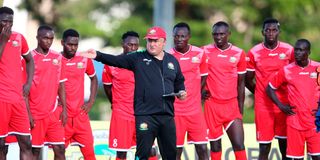
Harambee Stars coach Engin Firat gives instructions to his players during a training session at Moi International Sports Centre, Kasarani Annex on November 13, 2023.
The 53-year-old Turk, meanwhile, remains the Harambee Stars coach despite publicly stating Kenya does not have quality players because of the poor quality of the local league.
He has a point.
“Mwendwa had a dream but did not have to plan to transform the dream to reality,” said experienced coach Bob Oyugi, who is also the secretary of Kenya Football Coaches Association.
“No other football president has got the kind of financial aid that Nick (Mwendwa) has got from Fifa and the government to develop football in the country. If we do not have a football policy we will continue to struggle as a football nation,” Oyugi said.
The veteran coach criticized how coaching courses were conducted by FKF saying there was a lot of favouritism and unrealistic training where one could climb up the levels in months rather than years and without much practical exposure.
“If you do not have competent coaches to handle our players out there how do you expect to have quality players in the national team?” Oyugi posed.
His sentiments echoed what Extreme Sports Limited Head of Operations and Coordination Athanas Obango said in 2017.
“The criteria of identifying the coaches and their instructors (at FKF), whom I feel are not qualified, is not right. They are just hand-picked individuals who don’t have expertise.”
The results are there for all to see. Under Mwendwa's "new way of doing things", Kenya, after briefly rising to 85th in October 2016 has, without a coherent football plan, inexorably dropped down the Fifa rankings to now stand at a lowly 111 in the world, and 26 in Africa.
A far cry from a country that was once top eight in Africa.

